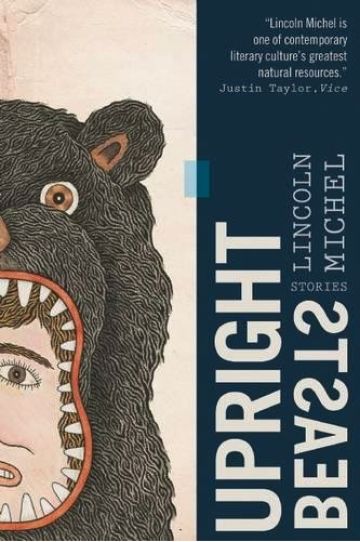UPRIGHT BEASTS by Lincoln Michel
Lincoln Michel's Upright Beasts (Coffee House Press) is a debut collection of short fiction comprised of genre-bending tales of dark comedy and humanity. From the outset, we are thrust into the world of the absurd: a school where all the teacher's have disappeared and the children have descended into an organized madness reminiscent of Lord of the Flies, equipped here, with aluminum baseball bats and Bunsen burners. This attention to detail is evident throughout the collection, most notably in the ‘his and hers' styled fixations on surveillance in “Our New Neighborhood.” It is this precision that allows Michel to get away with the majority of his seemingly ridiculous conceits, that and his unabashedly confident prose.
“Our New Neighborhood” is also perhaps where the heart of the collection lies; we are given access into the psychology of the characters without the guise of distance or overpoweringly overt ideological overtones. We are part of the community, not simply gawking from the window, as is sometimes a consequence of his deftly humorous diction. Michel is at his best when he blends his predilection for the comically absurd with emotionally resonant moments between characters. In “The Deer in Virginia”, Michel demonstrates a keen understanding for subtlety and grace that is sometimes dwarfed by the grandiosity of his environments. Here, there is an eloquence that resounds long after the two-page story is finished.
While Michel's style is perhaps more closely aligned with the likes of Raymond Carver, his short-shorts call to mind the genius of Lydia Davis, the ability to drop the reader into an unfamiliar environment and wound her before she has time to construct a defense. Psychological and physical distance is prominent in these stories.
Over the course of the collection, the reader is presented with a series of doors to step through, as is the case in “The Room Inside My Father's Room". The protagonist's quest for a larger room leads him to an unexpected unpacking of his lineage; yet he leaves that story, as we often do, with more questions than answers. Though there is a lack of resolve, the emotional reverberation is profound. When we are caught up in the physical moment, the poetry seeps silently through.
The balance Michel is able to strike here is quite lovely. “If It Were Anyone Else” appears early in Upright Beasts and serves in many ways, as a mirror for our experience reading the collection. It is a curious small story ebbing more on quirk than the fantastical. There are moments of potential human connection leveled by humor and a steady unwillingness to display compassion. We are left wondering: Where does the power of this strange bald man come from? Why is our narrator so immediately vulnerable to him?
Throughout Upright Beasts, we move, more or less, as the protagonist of that story, eating candy beans from a stranger, abandoning reason and restraint to surrender ourselves to the narrative. We follow Michel's voice down each increasingly odd alley in an attempt to permeate this world, often with a desire for richer, more fully realized human connection. While some turns ring less authentically, on the whole, this is a praiseworthy debut collection. It will haunt you long after the beasts have returned to the shadows.
Lincoln Michel is the online editor of Electric Literature and the coeditor of Gigantic. His work has appeared in Tin House, NOON, the Believer, American Short Fiction, Pushcart Prize XXXIX, and elsewhere. He was born in Virginia and lives in Brooklyn, NY.

 Jenessa Abrams is an MFA candidate in fiction and literary translation at Columbia University. She studied creative writing and child and adolescent mental health at New York University. Her fiction has been published in Bluestockings Magazine and The Grief Diaries. A short film, which she wrote and produced, was selected for the Cannes Short Film Corner in 2013. She lives in New York, where she's at work on a short story collection.
Jenessa Abrams is an MFA candidate in fiction and literary translation at Columbia University. She studied creative writing and child and adolescent mental health at New York University. Her fiction has been published in Bluestockings Magazine and The Grief Diaries. A short film, which she wrote and produced, was selected for the Cannes Short Film Corner in 2013. She lives in New York, where she's at work on a short story collection.